The ADATA Ultimate SU750 1TB SSD Review: Realtek Does Storage, Part 1
by Billy Tallis on December 6, 2019 8:00 AM ESTRandom Read Performance
Our first test of random read performance uses very short bursts of operations issued one at a time with no queuing. The drives are given enough idle time between bursts to yield an overall duty cycle of 20%, so thermal throttling is impossible. Each burst consists of a total of 32MB of 4kB random reads, from a 16GB span of the disk. The total data read is 1GB.
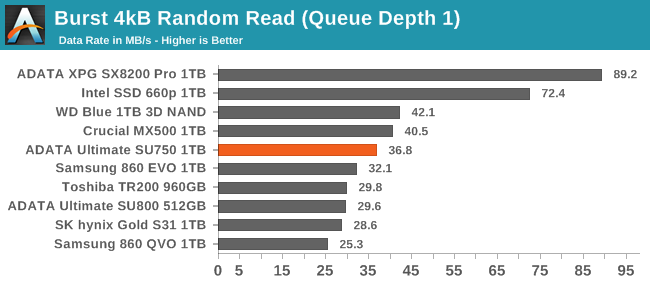
The burst random read performance from the ADATA SU750 is pretty good for a DRAMless SSD and competitive with mainstream SATA drives.
Our sustained random read performance is similar to the random read test from our 2015 test suite: queue depths from 1 to 32 are tested, and the average performance and power efficiency across QD1, QD2 and QD4 are reported as the primary scores. Each queue depth is tested for one minute or 32GB of data transferred, whichever is shorter. After each queue depth is tested, the drive is given up to one minute to cool off so that the higher queue depths are unlikely to be affected by accumulated heat build-up. The individual read operations are again 4kB, and cover a 64GB span of the drive.
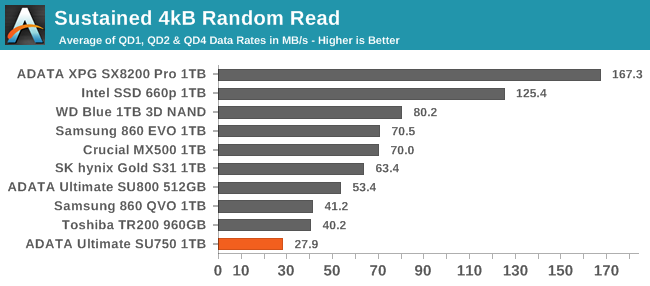
On the longer random read test, the SU750 falls to last place and is clearly slower than the other DRAMless SATA drive (Toshiba TR200) and the QLC-based Samsung 860 QVO.
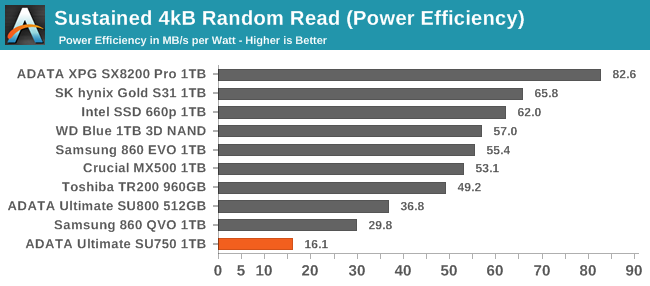 |
|||||||||
| Power Efficiency in MB/s/W | Average Power in W | ||||||||
The SU750 fares even worse on the power efficiency metrics, since it draws significantly more power here than any of the other SATA drives, despite being the slowest. This stands in stark contrast to the low power draw and reasonable efficiency offered by the DRAMless Toshiba TR200.
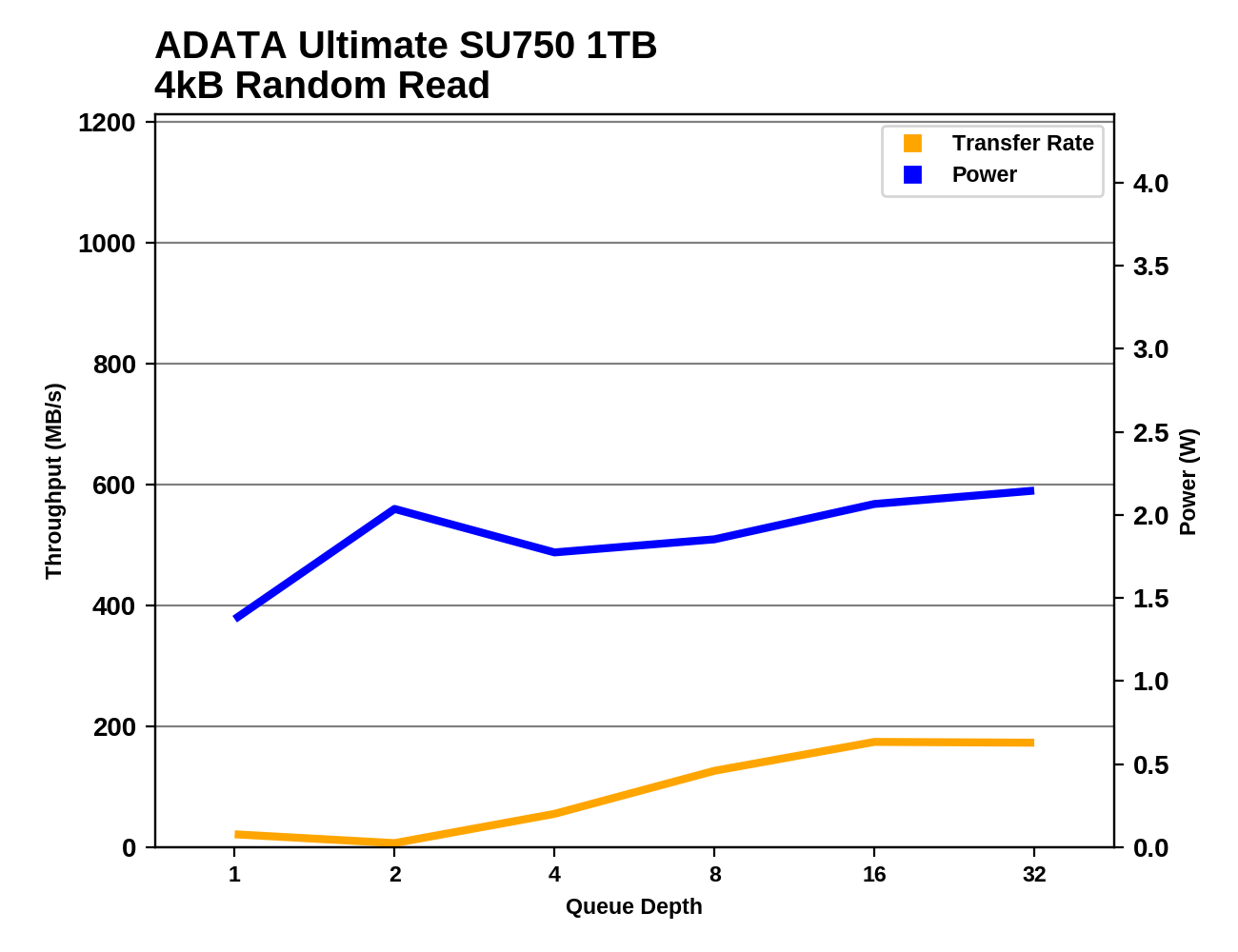 |
|||||||||
The SU750 actually managed to slow down as the test moved from a queue depth of one to QD2, and its performance grows slowly from there up to QD16. The spike in power consumption at QD2 suggests that the SU750 wasted all the idle time it was given after the test data was written, and didn't start cleaning up the SLC cache until the performance measurement was underway.
Even ignoring the poor performance and high power consumption at QD2 where the drive appears to be doing a lot of background work instead of handling the requests from the host system, the SU750 is fairly power-hungry throughout the test. There are only a handful of SATA drives in our benchmark database that have had a worse power to performance ratio on this test, and the performance of the SU750 tops out at less than half of what the best SATA SSDs are capable of providing.
Random Write Performance
Our test of random write burst performance is structured similarly to the random read burst test, but each burst is only 4MB and the total test length is 128MB. The 4kB random write operations are distributed over a 16GB span of the drive, and the operations are issued one at a time with no queuing.
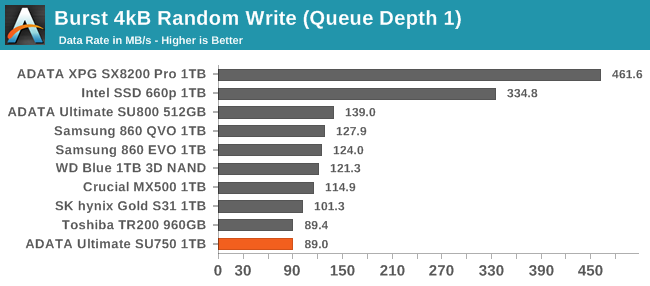
The ADATA SU750 is tied for last place in the burst random write performance test, hitting basically the same speed as the other DRAMless SATA drive on this chart.
As with the sustained random read test, our sustained 4kB random write test runs for up to one minute or 32GB per queue depth, covering a 64GB span of the drive and giving the drive up to 1 minute of idle time between queue depths to allow for write caches to be flushed and for the drive to cool down.
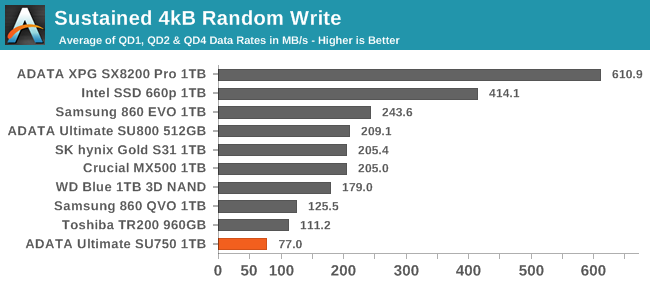
On the longer random write test that brings in some higher queue depths, the SU750 stands alone at the bottom of the chart, with clearly worse performance than the TR200 or the 860 QVO.
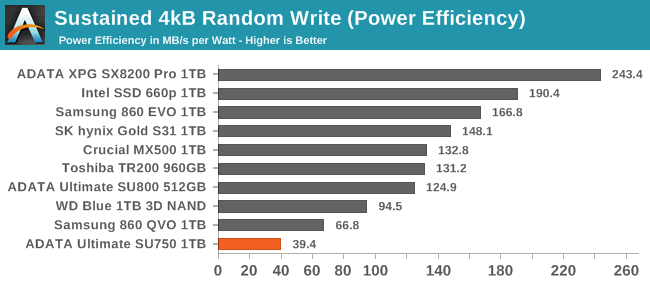 |
|||||||||
| Power Efficiency in MB/s/W | Average Power in W | ||||||||
The combination of having the lowest performance and highest power consumption among SATA drives again gives the ADATA SU750 an efficiency score that stands out as much worse than any of the other drives in this batch.
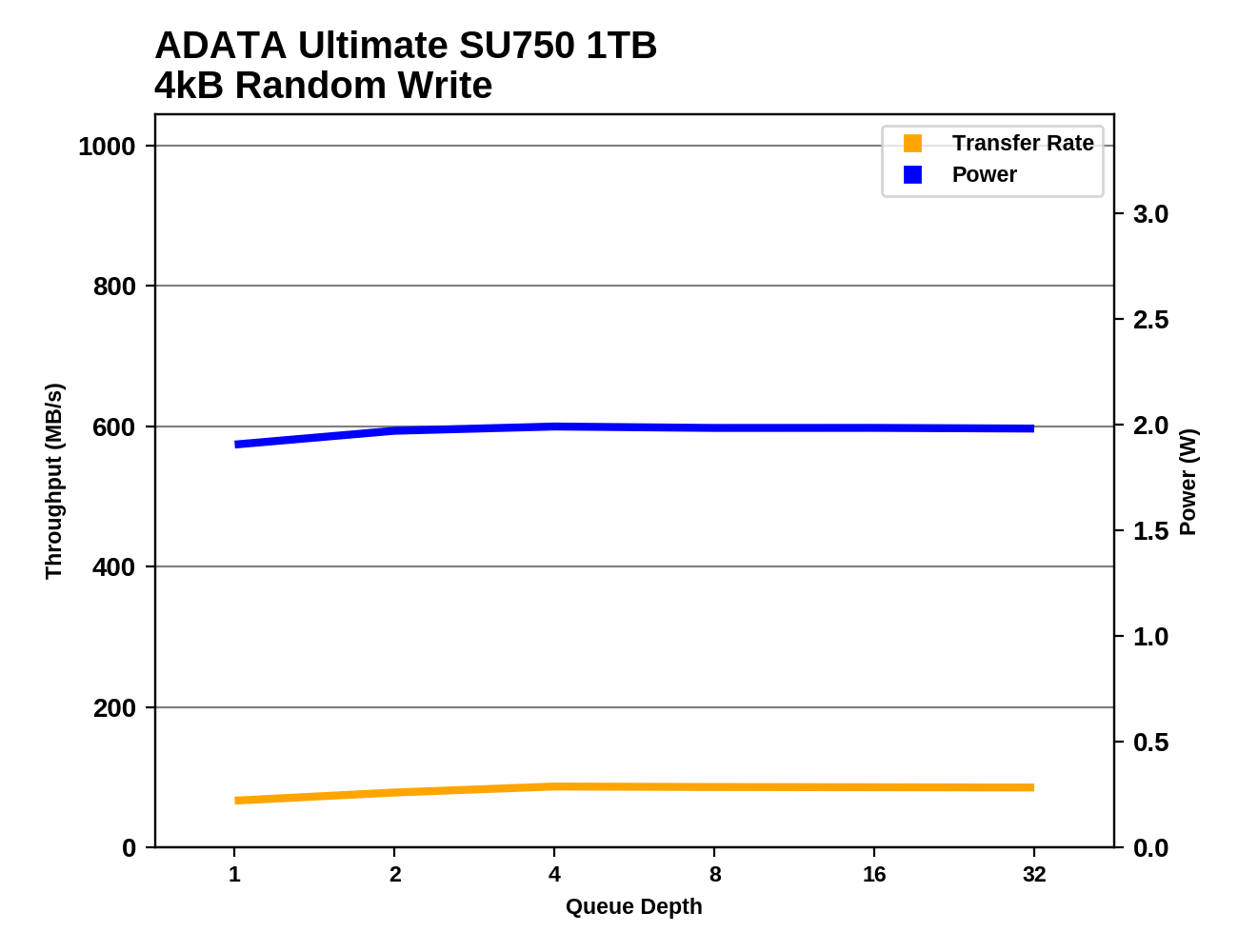 |
|||||||||
The SU750 shows minimal performance improvement from QD1 to QD4, and no further growth from there. At least it doesn't suffer a performance drop later in the test from SLC cache running out. The steady ~2W power consumption throughout the test is comparable to what most of the other SATA drives draw at higher queue depths, but at QD1 they aren't as power-hungry as the SU750.
The overall random write performance and power consumption results from the SU750 aren't the worst we've seen, but it definitely doesn't stray outside of the slow and power-hungry corner.


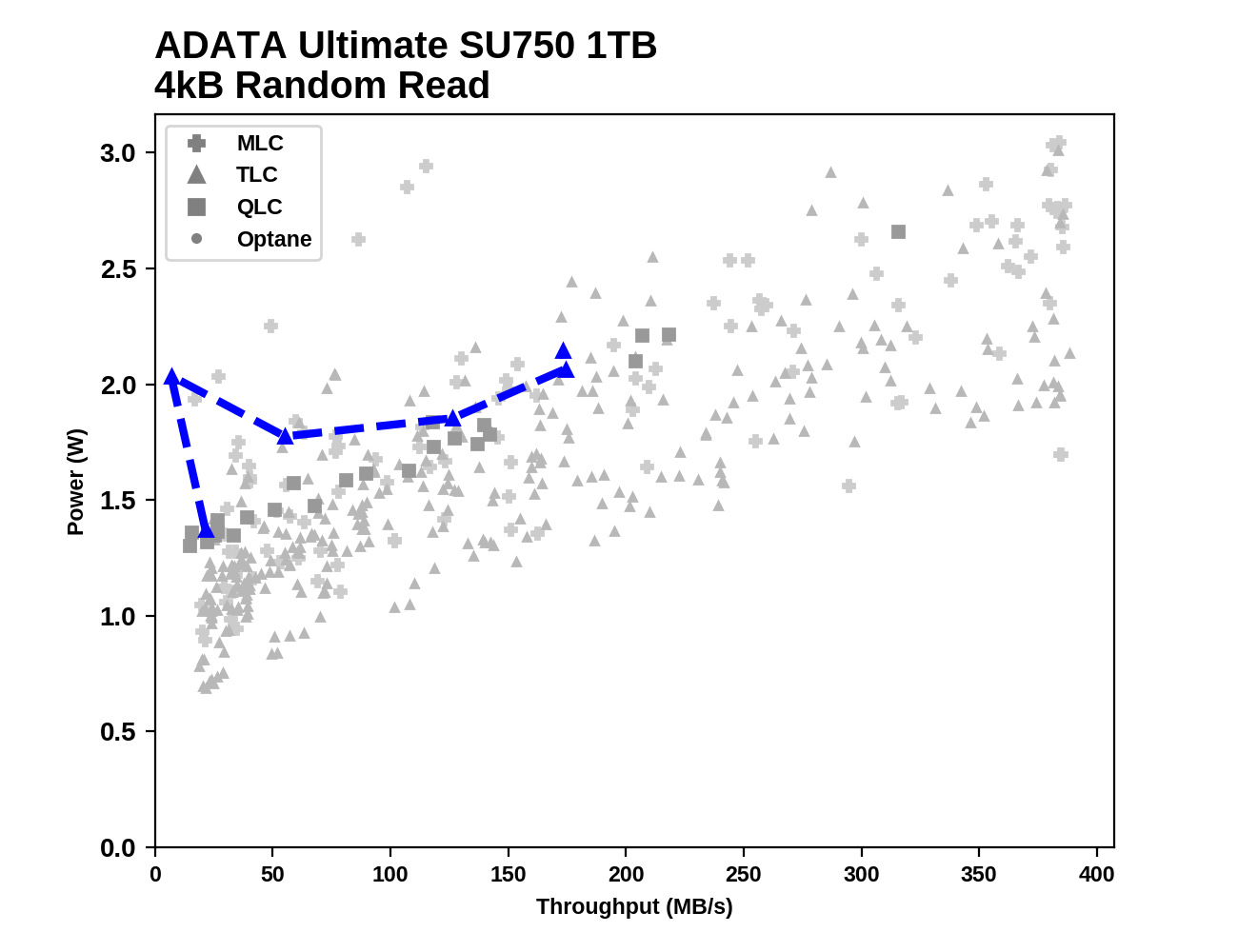









54 Comments
View All Comments
Samus - Sunday, December 8, 2019 - link
I didn't even want to bring up Killer XDdeil - Monday, December 9, 2019 - link
Well ONLY cards where I lost sound due to broken drivers is realteck. AND coincidentally ONLY network adapter that was supposed to do full gigabit, and stopped negotiation at 10 mbps was also realteck.they can do decent hardware, but soft from them is crappiest as possible.
HollyDOL - Saturday, December 7, 2019 - link
My 1st hand experience with Realtek dates back to Pentium 4 era. And it was so bad then I am still avoiding anything done by them in almost panic mode. Maybe they improved since then, but I am still not in state of mind to spend few $ to try.Gigaplex - Saturday, December 7, 2019 - link
Intel was terrible in the Pentium 4 era. Do you also avoid Intel in the same way?HollyDOL - Saturday, December 7, 2019 - link
Intel never had problems with functionality or output quality. For many scenarios you had better perf/$ on Athlons, but you didn't have problems having multiple computers on same network with Intel NIC having same MAC, lousy sound quality infested with noise or very low NIC performance.So no, I am not avoiding Intel same way since I never had remotely similar problems with them.
close - Saturday, December 7, 2019 - link
They weren't that bad. After building a neighborhood network (100Mbps and constantly saturated with Direct Connect P2P transfers) with thousands of clients (perhaps in the 5 figures or close to), 99.9% being Realtek network chipsets I'd say many of the issues are a bit overstated. Sure Intel was (is?) better but other than crappy support in Linux at that time, there was nothing out of the ordinary bad with Realtek. Not one MAC issue, not very low performance.I'm sure those thousands are not representative of all Realtek sales but I think there must also be some bias in there where the multitude of reports on forums makes you think it's an absolute rule that they were crap. Sound cards... dunno, had them on many PCs but rarely cared about the sound back in the day.
Samus - Sunday, December 8, 2019 - link
Terrible performance maybe. But Intel has always been fairly reliable. They've had a few minor chipset recalls, and the embarrassing, but very limited Pentium III recall, but on the whole they have traditionally had less errata than AMD and quite frankly their chipsets were always the gold-standard of PC's. Their network controllers are among the best in the world.PeachNCream - Friday, December 6, 2019 - link
ADATA has gotta get out of this town, out of this town and out of L.A. - with those prices. TRIM them to around $80 for 1TB and they will have a Solid pricing State to Drive sustained sales.bananaforscale - Friday, December 6, 2019 - link
Realtek does Dallas Semi?Lord of the Bored - Friday, December 6, 2019 - link
No, Maxim did Dallas Semiconduotor.